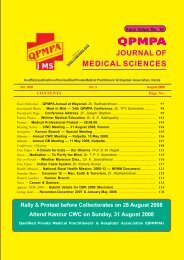QPMPA Journal September 2011 - Qualified Private Medical ...
QPMPA Journal September 2011 - Qualified Private Medical ...
QPMPA Journal September 2011 - Qualified Private Medical ...
You also want an ePaper? Increase the reach of your titles
YUMPU automatically turns print PDFs into web optimized ePapers that Google loves.
medical science<br />
○ ○ ○ ○ ○ ○ ○ ○ ○ ○ ○ ○ ○ ○ ○ ○ ○ ○ ○ ○ ○ ○ ○ ○ ○ ○ ○ ○ ○ ○ ○ ○ ○ ○ ○ ○ ○ ○ ○ ○ ○ ○ ○ ○ ○ ○ ○ ○ ○ ○ ○ ○ ○ ○ ○ ○ ○ ○ ○<br />
demystifying the<br />
cholesterol myth<br />
Low blood cholesterol<br />
and cancer<br />
So far, advertisers and news media have<br />
concentrated on the supposed danger<br />
from high levels of blood cholesterol. The<br />
dangers of low blood cholesterol levels<br />
have largely been ignored. Countries with<br />
diets high in saturated fats also tend to<br />
have high levels of colon cancer. In 1974<br />
a review of the Framingham data and<br />
those from Keys’ ‘Seven Countries’ study<br />
was carried out. It was expected to show<br />
that the cancer could also be blamed on<br />
high blood cholesterol. However, the baffled<br />
researchers found the opposite: those<br />
with the cancer had cholesterol levels that<br />
were lower than average.<br />
Reports of more than twenty studies into<br />
the relation between blood cholesterol<br />
and cancer have been published since<br />
1972. Most have reported an association<br />
between low blood cholesterol and cancer.<br />
The authors of the Renfrew and Paisley<br />
Study conclude:<br />
“It may be a mistake to assume that<br />
dietary advice given to the general<br />
The wisdom of the body decides the level of cholesterol and liver<br />
produce it as required. To kill a few rats, should we burn a house!<br />
Prof. B. M. Hegde<br />
Nature has taken good care that theory should have little effect on practice.<br />
– Samuel Johnson<br />
population to reduce the intake of saturated<br />
fat will necessarily reduce overall<br />
mortality.”<br />
In a study from the USA published in<br />
1990, changes in blood cholesterol over<br />
time were studied in patients with colon<br />
cancer. The doctors found that there had<br />
been an average thirteen percent decline<br />
in blood cholesterol levels in the ten years<br />
prior to diagnosis of the cancer compared<br />
with an average increase of two percent<br />
in the control group. Both those with<br />
the cancer and those free from it had similar<br />
blood cholesterol levels initially.<br />
It is possible that the decline in blood<br />
cholesterol levels was a result of the cancer,<br />
not the cause of it, but the investigators<br />
rule this out. They compare cholesterol<br />
studies with apparently contrary<br />
findings and show that in reality they<br />
are consistent. Comparing those that<br />
reported normal or high cholesterol<br />
readings several years prior to diagnosis<br />
with others where, at the time of diagnosis,<br />
levels were low, they conclude that<br />
it was a long term lowering of blood<br />
cholesterol levels that gave rise to the<br />
cancers. Interestingly, the average blood<br />
cholesterol level of those who developed<br />
the cancers declined to an average 5.56<br />
mmol/l and yet the British government’s<br />
Health of the Nation strategy still aims<br />
to reduce everyone’s levels to below<br />
5.2 mmol/l.<br />
Low cholesterol means<br />
more strokes<br />
Published at about the same time was a<br />
very large study in Japan, covering two<br />
decades, which concluded that low levels<br />
of blood cholesterol also increase the<br />
incidence of stroke. Over the past few<br />
decades, Japan has experienced a rapid<br />
change in its living and eating patterns.<br />
The Japanese are eating more total fat,<br />
saturated fatty acids and cholesterol,<br />
animal fats and protein, and less rice<br />
and vegetables. This has provided a<br />
unique opportunity for a large-scale,<br />
natural experiment into the effects of<br />
those changes.<br />
Investigators have shown that this<br />
change to Western and urban eating patterns,<br />
departing as it does from centuries<br />
old traditions, has been accompanied by<br />
○ ○ ○ ○ ○ ○ ○ ○ ○ ○ ○ ○ ○ ○ ○ ○ ○ ○ ○ ○ ○ ○ ○ ○ ○ ○ ○ ○ ○ ○ ○ ○ ○ ○ ○ ○ ○ ○ ○ ○ ○ ○ ○ ○ ○ ○ ○ ○ ○ ○ ○ ○ ○ ○ ○ ○ ○<br />
134<br />
<strong>QPMPA</strong>.JMS . Vol. XXV . No. 3 . June-Sept. <strong>2011</strong>



